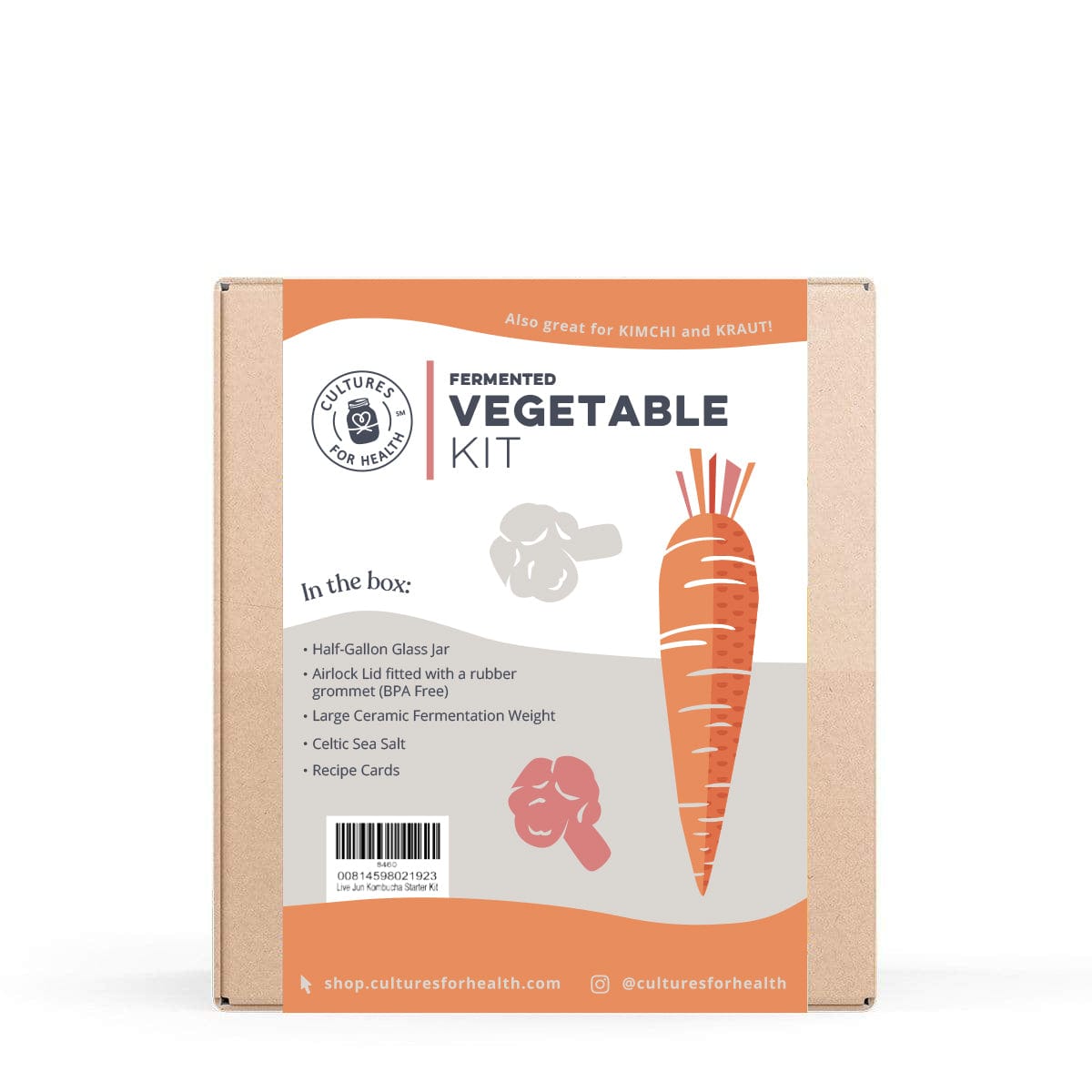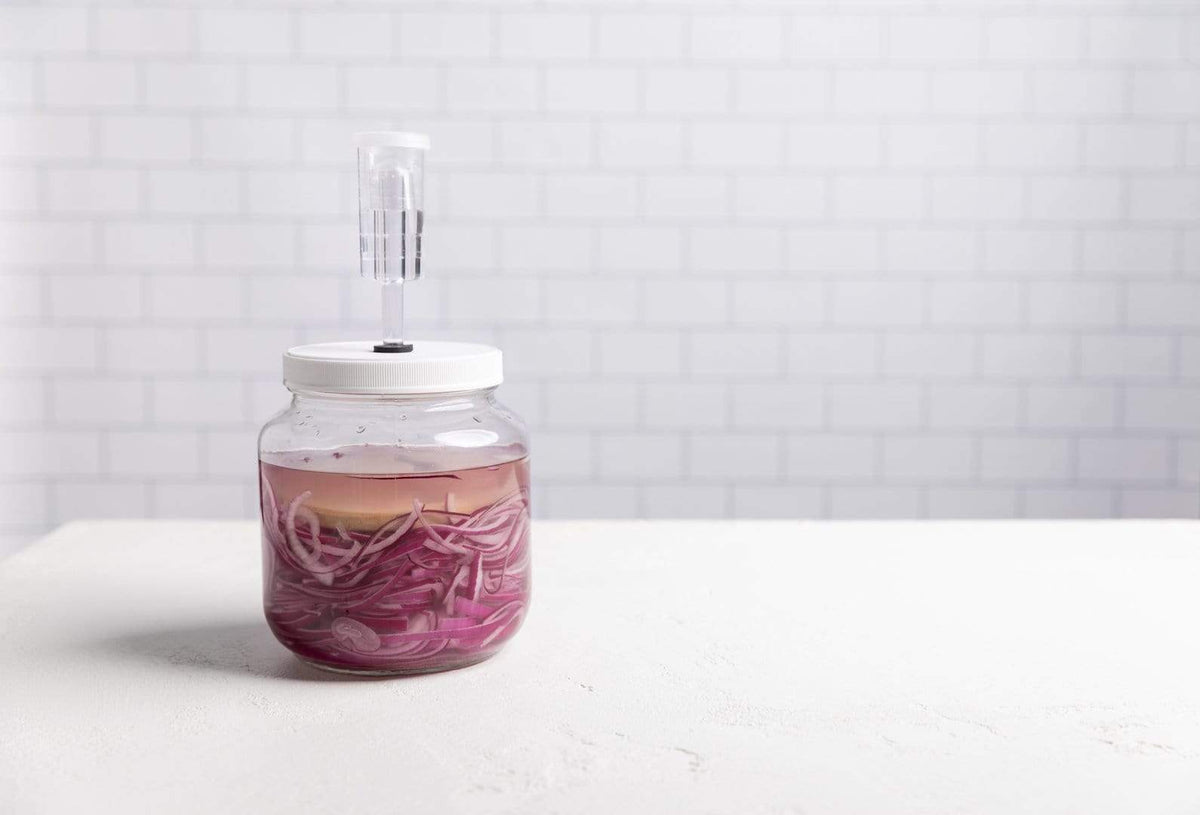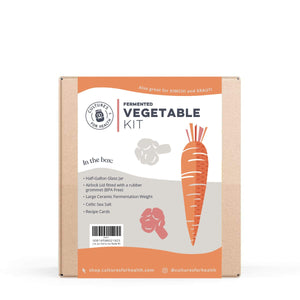
Kimchi is a fermented Korean dish made of vegetables with a variety of seasonings. It's a staple in Korean cuisine and is served at nearly every meal.
Kimchi is a popular choice for many Koreans, and is now gaining popularity in other parts of the world as well. But is kimchi good for you? Here are some of the kimchi benefits you can expect from eating this traditional food.
UNDERSTANDING KIMCHI: WHY IS IT GOOD FOR YOU?

What is Kimchi? Kimchi is a Korean fermented vegetable dish that'sbeen around for thousands of years. Thekimchi recipe is very easy to follow with just a few pieces offermenting equipment. It's made with cabbage and other vegetables, along with fish sauce, garlic, and red chili peppers.
With its characteristic spicy, tangy, and sour taste, kimchi pairs wonderfully with rice, and is one of the most loved Korean dishes due to its unique flavor profile, high nutritional value, and health benefits.
Famed for its medicinal properties, kimchi aids in alleviating symptoms of specific diseases, strengthening the immune system, and enhancing digestion. It's important to note that kimchi houses lactic acid bacteria that assist in food breakdown during digestion. In reality, consuming kimchi can help you avoid feeling bloated post meals!
Moreover, kimchi's fermentation process helps to naturally preserve the vegetables, significantly enhancing their shelf-life. This attribute of kimchi is particularly useful for those who like to prepare meals in bulk or reduce food waste. The fermentation process not only enhances the flavor but also aids in food preservation, making it a practical and healthy choice.
Thanks to kimchi’s main ingredient, cabbage, which is full of fiber, kimchi can alsolower cholesterol levels in the body, which is linked to cancer prevention. Aside from lowering cholesterol levels, kimchi alsolowers blood pressure.
But that's not just it! Let's explore the many other kimchi benefits.
EXPLORING THE NUTRITIONAL KIMCHI BENEFITS:

- Kimchi provides an array of antioxidants, including beta-carotene that combats free radicals. It also delivers other antioxidant and disease-fighting compounds. Researchers have found that the antioxidants in kimchi, produced during fermentation, help protect against oxidative stress and may reduce the risk of chronic diseases like heart disease and cancer.
- Kimchi offers calcium, which promotes bone health.
- Kimchi is also an excellent source of iron, facilitating oxygen transport in the body.
- Kimchi is a good source of potassium, aiding in lowering blood pressure.
- Kimchi also delivers vitamin C, which boosts immunity.
- Kimchi contains folate, necessary for maintaining healthy red blood cells, and several other vital vitamins that maintain our health, including vitamins A, thiamin (vitamin B1), riboflavin (vitamin B2), niacin (vitamin B3), and pyridoxine (vitamin B6).
- Apart from the above, kimchi also serves as a rich source of dietary fiber. Dietary fiber can help promote regular bowel movements, lower cholesterol levels, control blood sugar, maintain bowel health, and aid in achieving a healthy weight.
Kimchi Nutrition Facts (per 100g):
|
Calories |
15 KCal |
||||
|
Macronutrients |
Vitamins |
Minerals |
|||
|
Fat
|
0.5 g |
Vitamin A |
5 μg |
Calcium |
33 mg |
|
0.067 g |
Vitamin B1 |
0.01 mg |
Copper |
0.024 mg |
|
|
0.14 g |
Vitamin B2 |
0.21 mg |
Iron |
2.5 mg |
|
|
0.1 g |
Vitamin B3 |
1.1 mg |
Magnesium |
14 mg |
|
|
Carbohydrate
|
2.4 g |
Vitamin B6 |
0.21 mg |
Phosphorus |
24 mg |
|
1.06 g |
Vitamin B9 |
52 μg |
Potassium |
151 mg |
|
|
1.6 g |
Vitamin E |
0.11 mg |
Selenium |
0.5 μg |
|
|
Protein |
1.1 g |
Vitamin K |
43.6 μg |
Sodium |
498 mg |
|
Zinc |
0.22 mg |
||||
UNLEASHING THE PROBIOTIC POWER OF KIMCHI:

Probiotics are living microorganisms that are good for us. They help keep our bodies healthy by making it easier for us to digest food. They also increase the number of “good” bacteria in our guts and boost our immune system.
Probiotics are most commonly associated with yogurt and other fermented foods, such as kefir and kombucha. Kimchi is rich in probiotics, too. But many jarred kimchis available at the grocery store have been heated during the packaging process, resulting in the death of these probiotic organisms. This is why we recommend trying your hand at making your own kimchi.
Fermented Vegetable Kit
These beneficial bacteria are the result of a process called lactic acid fermentation, which happens when vegetables like cabbage are salted and left out at room temperature for several days. That process produces lactic acid bacteria (LAB).
LABs have many health benefits, including anti-inflammatory properties and cholesterol reduction. They also improve your immune system and can be effective in fighting off avian influenza (bird flu).
Probiotics in kimchi have also been proven to decrease the amount of carcinogen-activating enzymes and suppress the growth of pathogenic (bad) bacteria in the intestines.
KIMCHI BENEFITS FOR WEIGHT LOSS AND METABOLISM:

Yes, kimchi can potentially help with weight loss and boost metabolism!
Kimchi has been studied for its health benefits, including its potential to help with weight loss and boost metabolism. In onestudy of 22 overweight and obese patients, researchers found that eating fermented or fresh kimchi every day for four weeks resulted in lower body fat percentage and waist circumference.
In addition to weight loss, kimchi also has a low calorie count. A single serving of kimchi (150 grams) contains approximately 40 calories, making it a nutritious and filling snack or side dish that can be enjoyed without worrying about weight gain. The low energy density and high nutrient content of kimchi make it an ideal food for those looking to maintain a healthy weight or slim down.
Kimchi houses beneficial bacteria called lactobacillus that aid digestion. Researchers found that kimchi helped people lose weight by boosting their metabolism. They attribute this to the probiotic bacteria in kimchi. These bacteria assist in breaking down food and extracting more energy from it.
Furthermore, kimchi is rich in fiber, which may induce satiety after eating it. Plus, fiber aids in speeding up your metabolism. In fact, a study published in 2009 found that participants with high-fiber diets had lower body weights than those with diets low in fiber.
Related Source: Is Kimchi Gluten Free?
HOW KIMCHI BENEFITS HEART HEALTH:

The primary benefit of kimchi lies in its high content of heart-healthy probiotics. Several studies show that kimchi may help reduce inflammation and cholesterol levels, lowering your risk of heart disease and stroke. The fermentation process of kimchi contributes to its high levels of antioxidants, reducing inflammation and safeguarding the body from free radical damage.
Research has shown that the beneficial bacteria produced during fermentation can also help regulate blood lipid levels, reducing the risk of developing cardiovascular diseases. This effect, combined with the anti-inflammatory properties of kimchi, could contribute to the overall heart health benefits of this flavorful dish.
Other studies have found that eating kimchi canhelp prevent cancer cells from growing by inhibiting cell division.
Furthermore, kimchi also has the ability to reduce cholesterol levels significantly. In one study involving mice, kimchi was shown to potentiallyreduce cholesterol levels and inhibit fat accumulation in the liver.
KIMCHI BENEFITS IN MANAGING DIABETES:
Kimchi has also been shown to lower blood glucose levels and help control diabetes. The fermentation process of kimchi breaks down the carbohydrates in the vegetables into simple sugars that are easier for your body to digest. This can help lower blood glucose levels and increase glucose tolerance for those with Type 2 diabetes.
In a 4-week study, rats that ate freeze-dried kimchi along with a high-fat diet had better blood glucose controlthan rats that didn't eat kimchi. Their blood sugar levels were lower, and they responded better to insulin.
Another study found that people with prediabetes who ate kimchi experienced beneficial effects on several factors related to glucose metabolism. The research also showed that fermented kimchi (which is more nutritious than fresh kimchi) could also improve blood pressure and insulin sensitivity.
THE FINAL WORD: ARE THERE KIMCHI BENEFITS?
Yes, kimchi is good for you. There are plenty of health benefits of kimchi. It has been touted as a superfood for its anti-inflammatory and antioxidant qualities. It's also high in probiotic bacteria, which can help improve your immune system, reduce inflammation, and even lower cholesterol.
Kimchi is also loaded with nutrients and minerals such as vitamins A, thiamin (vitamin B1), riboflavin (vitamin B2), niacin (vitamin B3), pyridoxine (vitamin B6), folate (vitamin B9), calcium, iron, potassium, phosphorus, and magnesium.
The best part? Making kimchi at home is also super easy. You just need a little fermenting equipment and a few ingredients and you're good to go.
So go ahead and try your hand at making this delicious Korean dish!
































